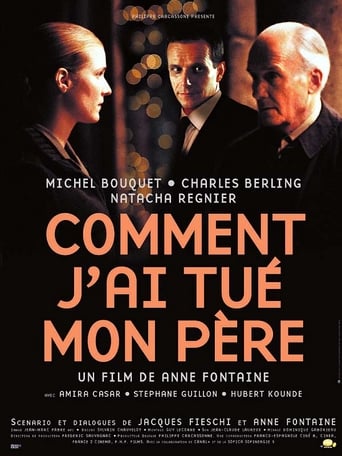MoPoshy
Absolutely brilliant
Mandeep Tyson
The acting in this movie is really good.
Stephanie
There is, somehow, an interesting story here, as well as some good acting. There are also some good scenes
Phillipa
Strong acting helps the film overcome an uncertain premise and create characters that hold our attention absolutely.
Red-125
The French movie "Comment j'ai tué mon pèrr (2001)" was shown in the U.S. with the title, "How I Killed My Father", but is also known as "My Father and I." The film was co-written and directed by Anne Fontaine.The movie stars Charles Berling, who portrays Jean-Luc, a successful gerontologist. (Successful in financial terms. He runs a boutique medical clinic for older people who can afford his fees, and who wish to retain their youthfulness.) He is very wealthy.Jean-Luc has it all--a beautiful wife (Natacha Régnier), a beautiful mistress (Amira Casar), and the time and money to utilize the services of a prostitute when he chooses. He's not completely happy, because it's hard to juggle his time at the clinic and in all those bedrooms. Still, he's contented and satisfied in his own cold, aloof, way.The plot begins with the arrival of his father, Maurice, played by the brilliant French actor Michel Bouquet. Maurice is also a physician. He has spent many years in Africa, which sounds noble. However, he simply walked out on his family when Jean- Luc and his brother were young. We gather from context that, even before he left, he didn't spend much time with his family. Maurice apparently did well enough in Africa until the government changed, when he was briefly imprisoned and then expelled from the country. Now he is in Versailles, observing and waiting.Although there are many sub-plots, they all revolve around Jean-Luc. As the movie progresses, you begin to see that he's not only cold and aloof, but also manipulative and selfish. Maurice is no saint, but he's a better person than his son.This isn't a film that you must find and see, but it definitely has some strengths, especially the acting by Berling and Bouquet. We saw it on an old VHS tape, and it worked well on the small screen.
paul2001sw-1
'Comment J'ai Tu Mon Pere' is the story of an apparently untroubled man whose control over his own life is threatened by the return of his difficult long-lost father. It's also one of those typically French films where everyone is beautiful and the drama proceeds by the subtlest of inflexion. And I find myself more willing to tolerate the first fault than I would be in an American film, partly because the characters are truly beautiful (in Hollyowood films they are often just healthy), and partly because of the second virtue. That is to say, the acting, script, cinematography and music are all superb, they bring a pained (and changing) life to this story where (superficially) nothing happens. It's true that you probably won't like this film if you do like the latest blockbuster; but the loss will all yours.
William J. Fickling
This superb French film is at times so closed and contained, in spite of several outdoor scenes, that at times it comes close to being claustrophobic. This isn't a criticism;the same could be said of some of Bergman's great films. But, likes some of Bergman's films, its intensity can be overwhelming. I won't reveal much of the plot, but suffice it to say that it seems to be saying that, no matter what our achievements, for many if not most people, life is largely a matter of surviving, that is, surviving the damage inflicted in the early years, and minimizing the amount if damage we inflict on others. A masterful and painful film. 9/10
frankgaipa
Many French films over the decades have begun with a voice, with or without images, one of the characters, usually the protagonist, speaking directly to the audience. "Comment j'ai tué mon père" begins with a male voice speaking, over blank-screen credits, about the trials of late middle age. Since our only other info has been the film's first-person title, when the bearded speaker materializes we assume he's our protagonist. He's just young enough to have a living parent, maybe one about to die. When the camera pulls back to reveal the gerontologist listening, we see this secondary figure as a prop, a movie cliché. But a cut disillusions. The speaker will never reappear. It's the gerontologist's story.Director Anne Fontaine's slight of hand continues throughout the film, so pervasively that it's difficult to go on here with giving away too much. It's far from only the gerontologist's story. At least three characters, not counting the opening speaker above, carry the point of view. Yet it's not "Rashomon." Perhaps appropriate in a film about aging, with a gerontologist dead center, the time line seldom wavers.

